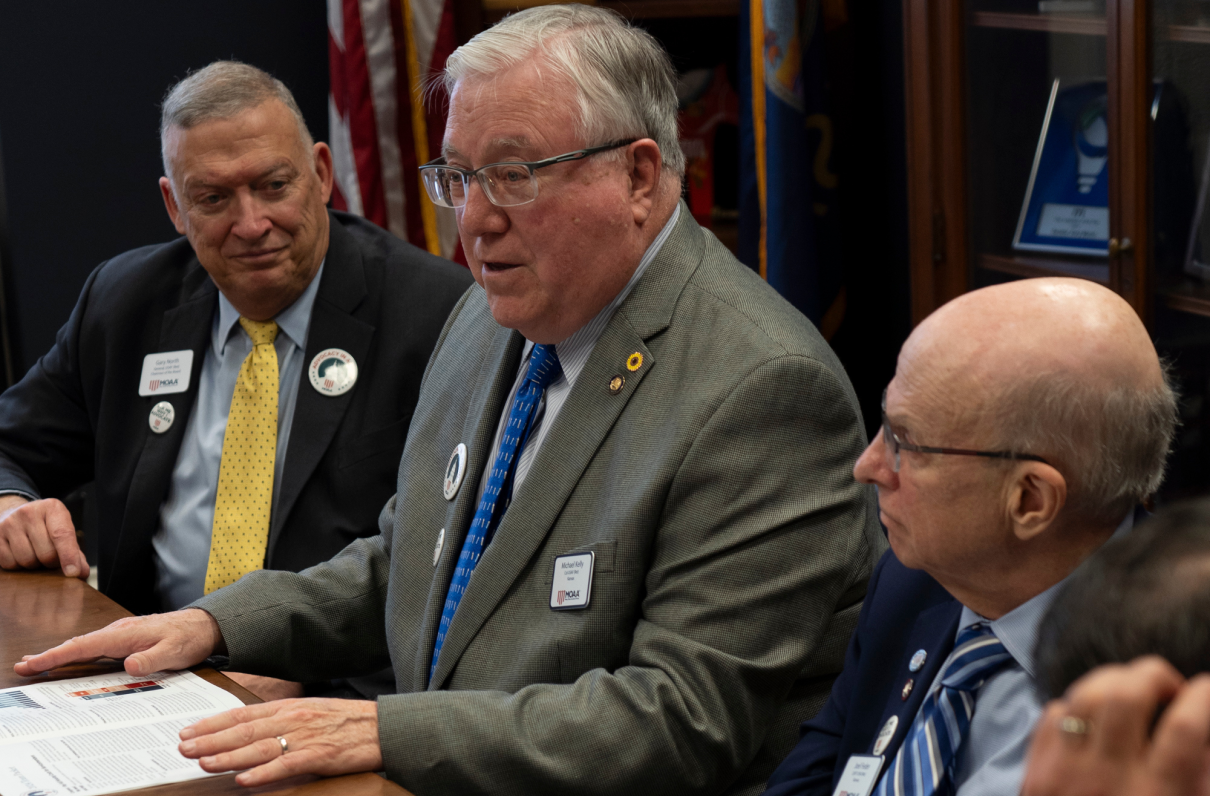(This article by MOAA staff originally appeared in the February 2025 issue of Military Officer, a magazine available to all MOAA Premium and Life members. Learn more about the magazine here; learn more about joining MOAA here.)
Col. Michael Kelly, USAF (Ret), is one of MOAA’s advocates who has come to Washington, D.C., to participate in the annual Advocacy in Action springtime event on Capitol Hill. In 2024, he made the visit as president of MOAA’s Jayhawk (Kan.) Chapter.
As 2025 began, he was looking forward to starting his term as president of the Kansas Council of Chapters as well as continuing as state legislative lead for the Kansas council.
Kelly described for Military Officer his approach to advocacy and the work that is yet to be done:
Q. What motivates you to advocate for MOAA?
A. Few Americans commit to military service, and that commitment is substantial and, in some cases, eternal. Those currently serving and their families, veterans, and survivors have earned more than pay and benefits.
All those members of the military community deserve a special level of respect from the protected members of society. I want to make sure civilian leaders fully recognize the arduous nature of military service.
[RELATED: MOAA Member Successfully Advocates for National Medal of Honor Highway]
Q. What approach works well for coalition-building?
A. Politics is a contact sport, and I attempt to make every contact informative and nonconfrontational. I emphasize: MOAA advocates for issues to benefit the military community. MOAA does not endorse partisanship or participate in partisan campaigns or elections for any public office except to individually cast our secret ballot according to law.
Q. What is the best way to communicate your message to legislators?
A. I think testimony provided in person is very effective. Legislators sometimes ask for additional details, and when those accurate details are provided, legislators feel better about the logical foundation of the votes they cast. Further, it is important to speak with members of the executive branch so they can advocate within the formulation of the state budget.
When you achieve a common perspective on need between the legislators and the cognizant executive agency staff, the likelihood of success goes way up.
Q. What issues in your state related to servicemembers and/or veterans should other states be aware of?
A. I’m pleased that Kansas passed a law (HB 2760) that, among other provisions, requires Kansas officials to consider federal disability determinations to be probative and prohibited state agencies and municipalities from reconsidering a veteran’s federal disability determination for benefits under state laws or local ordinances.
Until this bill became law, many Kansas statutes did not recognize disability determinations by the service secretary under Title 10, U.S. Code Chapter 61. Now under Kansas law, any active servicemember retired as a result of a physical evaluation board finding is considered a service-connected disabled veteran.
Other state advocates should make sure their service-connected veteran language refers both to Title 38 (VA) and Title 10 (defense secretary and other cabinet secretaries concerned) and not merely service-connected findings under the authority of the secretary of Veterans Affairs.
Q. What accomplishments would you like to share?
A. I’ve been gratified to work with the staff of the Defense-State Liaison Office (DSLO), which is part of the Office of the Secretary of Defense, Under Secretary of Defense for Personnel and Readiness. We’ve jointly advocated for streamlined spouse occupational licensing, the addition of the U.S. Space Force to the definition of armed forces in Kansas law, and other issues.
Michelle Richart is our DSLO regional representative. Her lived experience as a spouse of a recently retired Air Force officer, as a parent, and as a licensed attorney needing to re-enter the legal bar in each new PCS location makes her especially well informed on military family issues.
[RELATED: DoD Agency Names Top Priorities for State-Level Family Support in 2025]
Kansas passed a law (SB 431) to create a memorial at the Kansas State House for Army Chaplain Emil Kapaun. Chaplain Kapaun was captured when his unit was overrun during the Korean War. His gallantry and spiritual leadership as a POW resulted in the Medal of Honor, posthumously. I testified in support of the legislation and serve on the Kapaun Memorial Committee to advance the privately funded memorial project.
Q. What else would you like to get done?
A. Kansas currently enjoys a surplus in the State General Fund of about $2.4 billion. We need to reduce property tax on residences of veterans and active servicemembers.
I’d really like Kansas to reduce some, if not all, state income tax on active servicemembers. Kansas taxes everything on a servicemember’s W-2 except reenlistment bonuses. Fewer than 10 states fully tax the military income of
currently serving troops.
I’d like a formulation similar to the Combat Zone Tax Exclusion so that every enlisted member, warrant officer, and company grade officer would enjoy their Kansas income tax-free. I also hope the next Congress will have a member of the Kansas delegation on the House or Senate Armed Services Committee.
If you know of a MOAA member deserving recognition for their advocacy work, tell us at editor@moaa.org, and use “How I Advocate” in the subject line.
Want to Help Servicemembers in Your Community?
Learn how you can make a difference with your local chapter.
